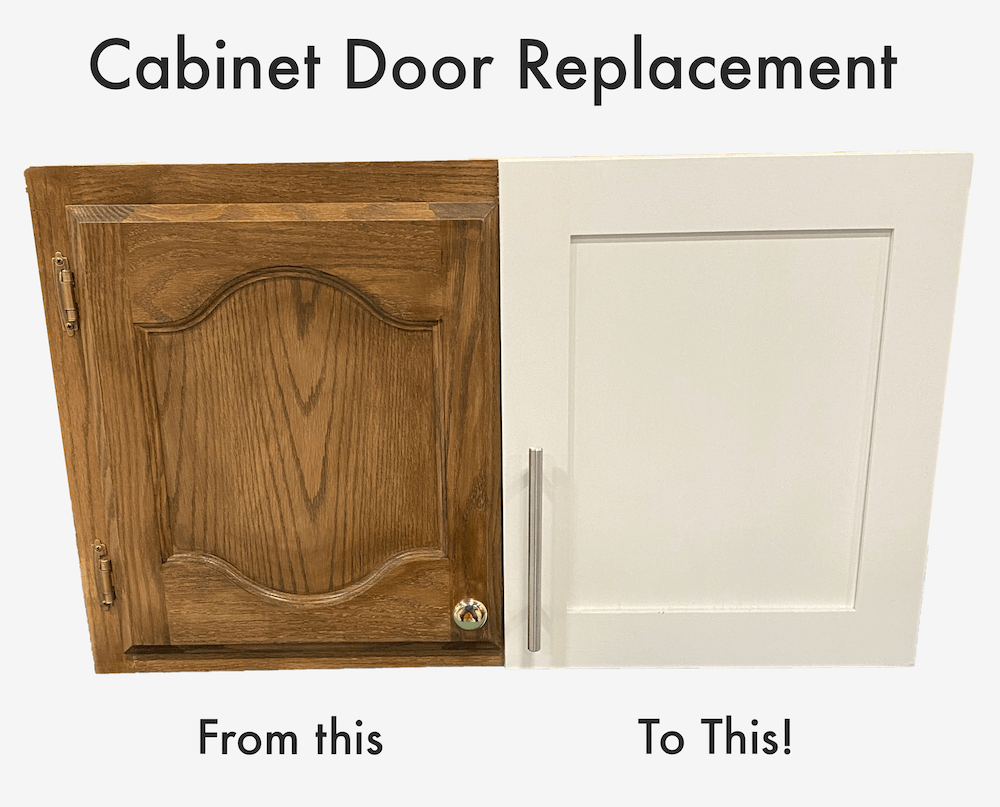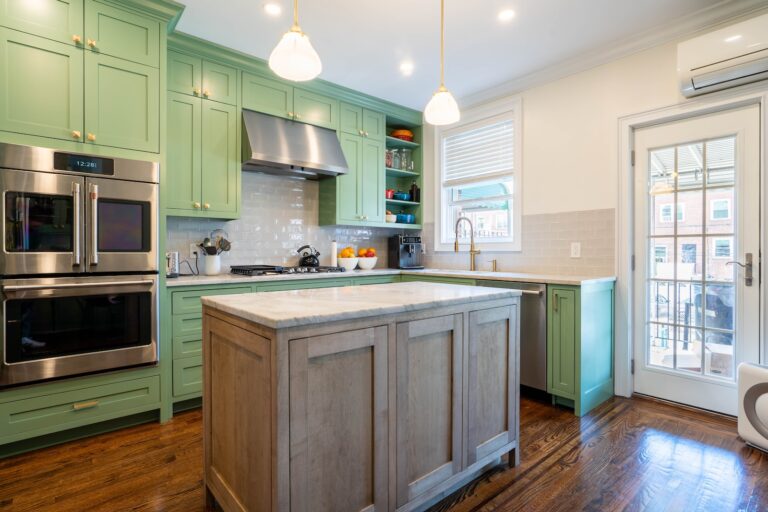When To Replace Kitchen Cabinets?
The kitchen is the heart of the home, where families gather to cook, eat, and spend quality time together. Kitchen cabinets are an essential part of any kitchen, providing storage and functionality. However, over time, they may become worn out, outdated, or damaged, leading you to wonder when it’s time to replace them.
If you’re considering replacing your kitchen cabinets, it’s essential to know when the right time is. Replacing your cabinets can be a significant investment, but it can also enhance the look and function of your kitchen, making it a more enjoyable space to spend time in. In this article, we’ll discuss when to replace kitchen cabinets and what factors you should consider before making the decision.

When To Replace Kitchen Cabinets?
Kitchen cabinets are an essential part of any kitchen. They are not only functional but also add to the overall aesthetics of the kitchen. However, like any other fixture, they also have a lifespan. At some point, you will need to replace your kitchen cabinets. But how do you know when it’s time to do so? In this article, we will discuss the signs that indicate it’s time to replace your kitchen cabinets.
1. Cabinets are Damaged Beyond Repair
Over time, kitchen cabinets can suffer from wear and tear. If your cabinets are damaged beyond repair, it’s time to replace them. Signs of damage include warped or cracked wood, broken hinges, and peeling laminate. If you ignore the damage, it can become a safety hazard.
Replacing damaged cabinets not only improves the aesthetics of your kitchen but also ensures that your kitchen is safe to use. You can choose from a wide range of materials, colors, and finishes to match your style and preferences.
2. Functionality Issues
If your cabinets are not functioning as they should, it’s time to consider replacement. Signs of functionality issues include drawers that don’t slide smoothly, doors that don’t close properly, and shelves that sag. Poor functionality can make it difficult to use your kitchen effectively.
Replacing your cabinets with new ones can improve functionality, making your kitchen more efficient. You can opt for modern features such as soft-closing hinges, pull-out drawers, and adjustable shelves, which can make your kitchen more user-friendly.
3. Outdated Style
Your kitchen cabinets should complement the overall style of your home. If your cabinets are outdated and don’t match your current style, it’s time to replace them. Outdated cabinets can make your kitchen look old and dull.
Replacing your cabinets with new ones can give your kitchen a fresh and modern look. You can choose from a variety of styles, from traditional to contemporary, to fit your style and preferences.
4. Mold and Mildew
Mold and mildew can pose serious health risks. If your cabinets are affected by mold and mildew, it’s time to replace them. Signs of mold and mildew include discoloration, musty odors, and a slimy texture.
Replacing your cabinets can eliminate mold and mildew, ensuring that your kitchen is safe to use. You can choose from materials such as stainless steel, which is resistant to mold and mildew.
5. Water Damage
Water damage can cause serious structural issues in your cabinets. If your cabinets are affected by water damage, it’s time to replace them. Signs of water damage include warping, swelling, and discoloration.
Replacing your cabinets can prevent further damage to your kitchen. You can choose from materials such as PVC, which is resistant to water damage.
6. Lack of Storage Space
If your kitchen cabinets are too small to accommodate your needs, it’s time to consider replacement. A lack of storage space can make it difficult to organize your kitchen effectively.
Replacing your cabinets with new ones can increase storage space, making it easier to organize your kitchen. You can choose from features such as tall cabinets, deep drawers, and pull-out shelves, which can maximize storage space.
7. Energy Efficiency
Older cabinets may lack energy-efficient features such as LED lighting and low-emission finishes. If you want to reduce your energy bills and carbon footprint, it’s time to consider replacing your cabinets.
Replacing your cabinets with energy-efficient ones can help you save money on your energy bills and reduce your carbon footprint. You can choose from features such as LED lighting, low-emission finishes, and recycled materials.
8. Increased Home Value
Replacing your kitchen cabinets can increase the value of your home. A modern and stylish kitchen can make your home more attractive to potential buyers.
Replacing your cabinets with new ones can increase the value of your home, making it easier to sell in the future. You can choose from a variety of styles and materials to match your home’s style and preferences.
9. Cost of Repair
If the cost of repairing your cabinets is more than the cost of replacing them, it’s time to consider replacement. Repairs can be expensive, especially if you need to replace multiple components.
Replacing your cabinets can be a cost-effective solution in the long run. You can choose from materials such as laminate, which is affordable and durable.
10. Personal Preference
If you simply want to upgrade your kitchen cabinets for personal preference reasons, it’s time to consider replacement. Your kitchen is a reflection of your personality and style.
Replacing your cabinets with new ones can give your kitchen a fresh and modern look, which can reflect your personal style and preferences.
In conclusion, there are several signs that indicate it’s time to replace your kitchen cabinets. If your cabinets are damaged beyond repair, have functionality issues, are outdated, have mold and mildew, are affected by water damage, lack storage space, lack energy efficiency, increase home value, have a high cost of repair, or you have personal preferences, then it’s time to consider replacement. By replacing your cabinets, you can improve the aesthetics, functionality, and safety of your kitchen.
Frequently Asked Questions
Here are some common questions regarding when to replace kitchen cabinets:
1. How long do kitchen cabinets usually last?
Kitchen cabinets are expected to last for about 15-20 years depending on their quality and maintenance. Cabinets that are constructed using higher quality materials and have proper maintenance tend to last longer than those that are made from cheaper materials and are not well taken care of.
If your kitchen cabinets are approaching or have exceeded their expected lifespan, then it might be time to consider replacing them.
2. What are some signs that my kitchen cabinets need to be replaced?
One of the most obvious signs that your kitchen cabinets need to be replaced is if they are damaged or broken. Other signs include excessive wear and tear, water damage, mold and mildew growth, doors and drawers that don’t close properly, and outdated or unattractive appearance.
If you notice any of these signs, it’s best to consult with a professional to assess whether or not you should replace your kitchen cabinets.
3. Can I just replace the doors and drawers of my kitchen cabinets?
Yes, you can replace just the doors and drawers of your kitchen cabinets if they are the only parts that need to be updated. This is a less expensive and less time-consuming option than completely replacing the entire cabinet system.
However, if your cabinets are damaged or outdated beyond just the doors and drawers, a full replacement may be necessary.
4. How much does it cost to replace kitchen cabinets?
The cost of replacing kitchen cabinets can vary widely depending on the size of your kitchen, the quality of materials used, and the complexity of the installation process.
On average, homeowners can expect to pay between $5,000 and $15,000 for a full cabinet replacement. However, costs can range from as low as $2,000 for a basic cabinet replacement to over $20,000 for a high-end custom cabinet installation.
5. Should I hire a professional to replace my kitchen cabinets?
While it is possible to replace your kitchen cabinets on your own, hiring a professional is recommended to ensure that the job is done correctly and efficiently.
A professional will have the necessary skills and experience to properly measure and install your cabinets, as well as to address any potential issues that may arise during the installation process.

Kitchen Cabinet Replacement Time-Lapse
In conclusion, knowing when to replace kitchen cabinets can save you a lot of time and money in the long run. If your cabinets are outdated, damaged, or no longer functional, it may be time to start considering a replacement.
However, before making any decisions, it’s important to assess the condition of your cabinets and consider your budget. You may be able to get away with refacing or repainting your cabinets instead of a full replacement.
Ultimately, the decision to replace your kitchen cabinets should be based on your personal preferences and needs. If you’re looking to update your kitchen and improve functionality, replacing your cabinets can be a great investment. Just remember to take your time, do your research, and work with a reputable contractor to ensure the best results.






